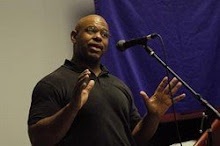Unfortunately when discussing matters of race and class, too many Christians fall into the trap of thinking that the issues are about personal prejudices. They tend to oversimplify discussions about racism, choosing to focus on anecdotes of who has caused whom pain. When it comes to analyzing why congregations tend to be segregated Christians offer explanations that suggest the main issue is that of different worship styles -- an easy possible answer but not the real answer!
Many well-meaning Christians try to highlight multi-cultural, or interracial congregations, suggesting that they provide models for integrating Christians in America. But we should not be so hasty! Having served as a pastor in a congregation that viewed itself as ethnically diverse, the question is not one of what the website looks like, or whose faces are in the literature; the question is: "with whom does the power rest?" The power rests with those who can advance the mission of the congregation, or more sadly, who can thwart that mission, even without holding any office in the church. Typically, even in multicultural congregations, that power rests with white people. Even in churches with pastors who belong to an ethnic minority group, it is white people who set the church's agenda. Blacks and other minorities are more likely to defer to whites in order to keep the church "multi-ethnic" because the threat of whites leaving is more of a concern than the threat of minorities leaving the church.
In her book, The Elusive Dream: The Power of Race in Interracial Churches, Dr. Korie L. Edwards does an excellent job of discussing the issue of power and privilege without oversimplifying the topic and reducing it to one of who gets to sing their songs and when. Dr. Edwards does focus on one congregation, but uses data from national surveys to bolster her observations about "Crosstown Community Church," the pseudonym for a church with an evangelical African American pastor who was educated at Dallas Theological Seminary and clearly trained under Dr. Tony Evans. That "interracial" congregation typifies the problem: Minorities are the ones who have to make adjustments for the sake of the interracial image; whites have the power. As Dr. Edwards puts it: "I propose that interracial churches work, that is remain racially integrated, to the extent that they are first comfortable places for whites to attend" (p. 6). As the book jacket notes, interracial churches cause African Americans, for example, to "conform to white expectations in church just as they do elsewhere."
I am grateful for Dr. Edwards's analysis and hope that it can help more Christians to understand that power and privilege are the real issues at work in churches, no matter how much we sing about the love of Jesus. When it comes down to it, those with power in society wield the most power in church as well.
